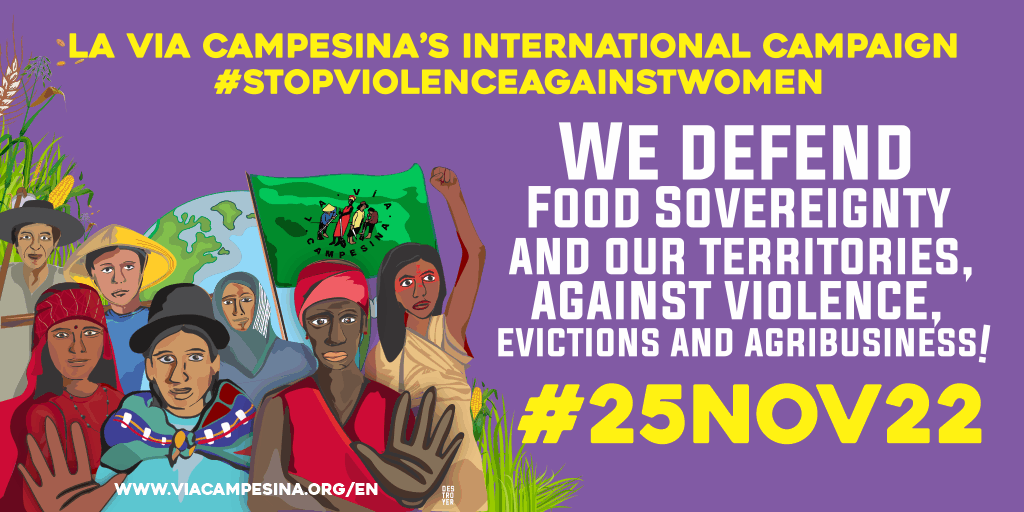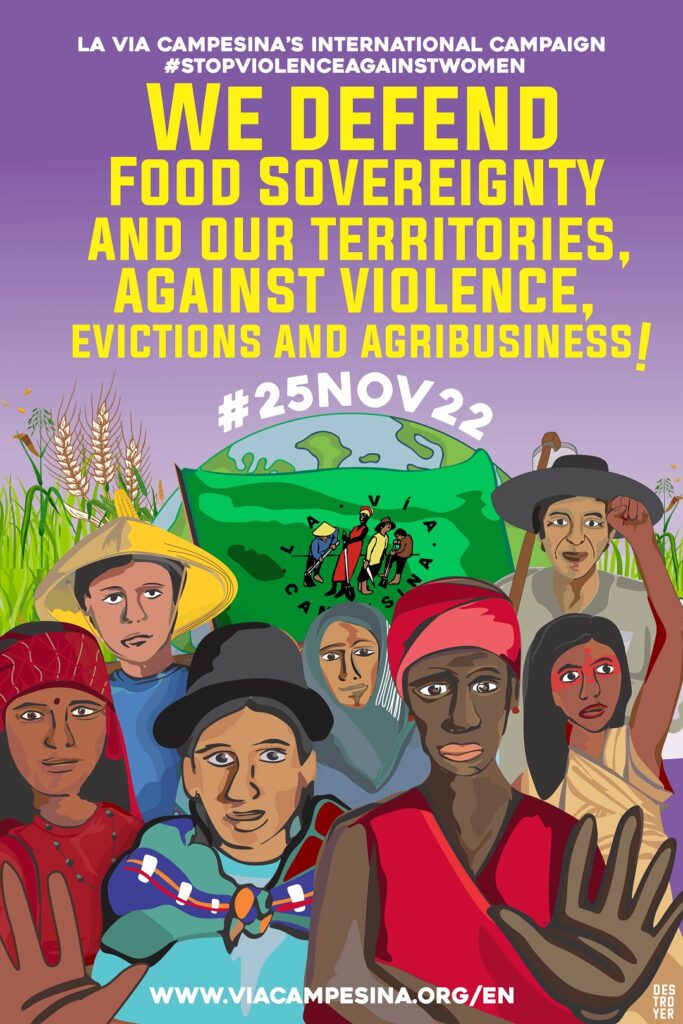#25Nov22 – We defend Food Sovereignty and our territories from violence, evictions and agribusiness!

Call To Action
(Bagnolet, November 15, 2022) On 25 November 2022, International Day for the Elimination of Violence Against Women, as peasants organised in La Via Campesina, we demand Food Sovereignty, the right to land, and an end to criminalisation and all types of violence in the countryside and the cities. At the same time, we condemn the fact that in the midst of a food, political and economic crisis, the rates of violence against women, children and minorities are alarmingly high. There is an urgent need to build societies free from violence and peaceful communities with social justice.

In addition to the situation of structural violence experienced by women in the world, there is the high cost of living, the aftermath of COVID 19, the work of caring for the elderly and children due to lack of state infrastructure, lack of employment, forced displacement and migration, wars and climate disasters.
Today more than ever we must consolidate Food Sovereignty as living spaces in the territories, and as a concrete way to confront capitalist, colonial and patriarchal policies that oppress and violate women and commodify life. Worldwide, it is estimated that 2 out of 3 women have suffered abuse in their lifetime. In the countryside, violence is further deepened by the expansion of agribusiness, extractivism and land grabbing, as well as the lack of policies to support peasants, especially women. The main economic resources are earmarked for large agricultural investments in agri-hydro and mining business. Meanwhile, violent evictions, feminicides and criminalisation continue with total impunity in complicity with the state and the judiciary.
Throughout these 30 years, the political proposals of La Via Campesina have remained valid and more relevant than ever, and peasants play a fundamental role in Food Sovereignty, in the conservation of biodiversity, in the production of healthy food with agroecological practices, in markets, in the family economy, and in political and organisational life. However, peasant women, indigenous women, sea and forest women, landless women, fisherwomen, and pastoralists continue to demand structural equality, paid and dignified work in the countryside, recognition of care work, guaranteed political participation, access to land, the right to basic services and investment in peasant agriculture as recognised in the Declaration on the Rights of Peasants adopted by the UN in 2018.
Article 4: Non-discrimination against women:
- States shall take all appropriate measures to eradicate all forms of discrimination against rural women and other women working in rural areas and to promote their empowerment so that they may fully enjoy, on equal terms with men, all human rights and fundamental freedoms and be able to work for, participate in and benefit freely from the economic, social, political and cultural development of the rural environment.
Let’s defend our territories from agribusiness and femicides!
We cannot allow agribusiness and the plague of feminicide to advance in our territories; feminicides are today the most violent expression of patriarchy over women’s bodies, and the numbers are growing all over the world. This is why we call on our member organisations and allies to commit to our Stop Violence Against Women Campaign launched in 2008, which is a political and pedagogical tool for dialogue within our organisations, regions and with societies. It also allows us to articulate struggles with women’s organisations and diversities in the cities to demand rights, justice and an end to impunity.
Currently, the Americas is one of the most violent continents for women, with most of these murders occurring in the family environment as well as by common and organised crime. For example, in Ecuador, a feminicide is registered every 31 hours. While in Brazil, one occurs every 7 hours and a rape every 10 minutes.
In Europe, the rise of the extreme right is causing an increase in cases of femicide, as in Italy, where these cases increased by 15%, in France, where femicides are recorded every 48 hours, and in Spain, where 76 femicides and other murders of women have been recorded so far in 2022.
Violence against women and children is also high in Africa, particularly in conflict zones such as the Democratic Republic of Congo. In South Africa, from April to June 2022, more than 9,500 cases of rape were reported, and almost 4,000 of these rapes took place inside homes.
Likewise, in Southeast Asia, 33 percent of women with intimate partners between the ages of 15 and 49 will experience physical and/or sexual violence by a current or former husband or male partner at least once in their lifetime, according to reports.
In this sense, as La Via Campesina, we urge States to invest in public policies for prevention of and response to gender-based violence, we demand mechanisms so that justice bodies are aware of gender issues, so that they have empathy and respect when dealing with these cases, as well as political and economic conditions on the part of the State that guarantee sufficient experts and respect for the dignity of the survivors.
Women all over the world require comprehensive public health care and guarantees of their human rights. Instruments such as the purple code, which aims to protect and give priority attention to women victims of gender-based violence, have proven not to work, and survivors are re-victimised through long and tedious legal proceedings, which is why many women drop their complaints. In many countries and cultures, girls continue to be forced to marry and give birth, while millions of women die from back-alley abortions, with no guarantee of their sexual and reproductive rights such as access to dignified menstruation.
That is why as La Via Campesina, every 25 November, we raise our voice for memory, justice and reparations for all women who struggle, defenders of territories and survivors of violence. We stand in solidarity with the families and organisations, and express our concern for all defenders, women, youth and minorities who experience harassment, violence and reprisals from the state, transnational corporations and the judiciary for their active resistance to agribusiness.
On this day of action, together with organised and rebellious women from all over the world, we will call for marches, forums, direct actions in courts, fairs and other events denouncing the daily and structural violence experienced by women and peasant minorities.
Download and share! #StopViolenceAgainstWomen #25Nov22
You are very important to amplify our voices and actions, we need to show unity of action, download our official poster and communication materials for social networks available in ES, FR and EN, you can also find a blank version to put it in your local language, here. Check out our publication ” The Path of Peasant and Popular Feminism in La Via Campesina”, study version and graphic version for grassroots work.
Join us!
Send us information about your actions, videos and photos to our email: communications@viacampesina.org, tag us on social media: Twitter (@via_campesinaSP/@via_campesina/@viacampesinaFR), Facebook (@viacampesinaOFFICIAL), Instagram (@la_via_campesina_oficial), and make our collective mobilisation for societies free from violence and agribusiness globally visible.
